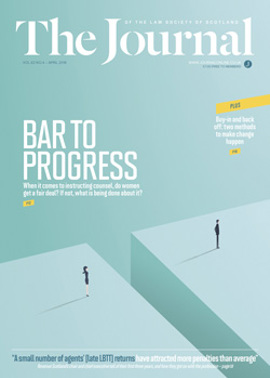Profile: Paul Mosson

Tell us a bit about your career so far…
For a brief time I was a consultant specialising in leadership and strategy within the legal sector, but within six weeks of starting my own business I was approached by a recruitment consultant about the role at the Society.
Before this I was director of services at the Bar Council of England & Wales. I joined the Bar Council as head of member services and established its commercial operations and member servicing functions, building a modern, outward-facing service culture. I had several roles at the Bar Council during my nine years there, including director of the Policy team for nearly a year. It was a fantastic time working with some brilliant legal minds and I left having made some great friends and with a sense of real achievement. It was rewarding to leave it all in the hands of a talented and bright team.
One of the achievements I am most proud of is the creation of the first legal-specialised third party managed account (or escrow account as it is also known). BARCO, which was established in 2012, has innovated the client fund management options for law firms and barristers’ chambers across England & Wales. When I was first asked to look at this in the summer of 2012 I had no idea what an escrow account was, let alone how to build one. But by December that year the FSA, as the FCA was known back then, had approved our application and we had built one of the first legal fintech companies. In the preceding six months I had to become as close to an expert as I could on the handling of client funds for barristers and solicitors, and the Payment Services Regulations of 2009. To say it was a steep learning curve would be an understatement. Yet almost six years later BARCO has been pivotal in changing attitudes towards centralising the handling of client money, a process that if done properly, can reduce risk considerably for all involved.
My earlier career included roles in retail banking, online stockbroking and social housing. But one of my favourite jobs was as a waiter, my first ever job and one where I met the first of a handful of inspirational female leaders who would motivate me to achieve more and more in my career.
Why did you decide to join the Society?
It was during my career with the National Housing Federation that I decided to study law and earned my LLB. I chose law because I have always been fascinated by analysing and solving problems in order to form arguments. This often led to frustration with my parents, who wished I would accept “Because I told you so”, which to this day I’m still not very good at.
So after completing my LLB I wanted to use it but by this point, I had also realised that I enjoyed developing commercial ventures and developing new services. I therefore consider myself very fortunate that the role at the Bar Council of England & Wales came along. This role allowed me to satisfy my appetite for the law in an environment where I could innovate and create. I also thrived in such an intellectually stimulating environment where the highest standards are the norm. I love working with lawyers, whatever their discipline and jurisdiction. When I took the decision to move on from the Bar Council, I never dreamed I would be lucky enough to find an opportunity once again to work with lawyers in a similar way. I’m delighted that I was wrong. I was thrilled when I was selected to join the Law Society of Scotland.
Have your perceptions of the Society changed since you started?
Honestly, no. Having first encountered the Law Society a couple of years ago I had already reached the conclusion that it was a positive, friendly place to work with a warm and modern culture that strives to succeed. Looking on from a distance I already knew it was an organisation I wanted to be part of, with a senior leadership team I knew I could learn from, and contribute to.
What have been the highlights for you personally?
What I was not prepared for was the extent to which colleagues and members of the profession would welcome me to both the Society and Scotland. Even before I arrived in Edinburgh last November I was receiving messages from board and Council members, other solicitors and colleagues welcoming me. That welcome and assistance in helping me settle in did not stop there, and nearly five months later, I’ve had the pleasure of meeting so many of our members and my colleagues continue to help me settle in.
I’ve said many times to those who have asked, I believe the culture of this friendly and hardworking meritocratic profession is reflected in its professional body. But then I don’t think that is a surprise.
What are the main issues that you think the Society/your department has to address at the moment?
We have ambitious income targets which are essential to keeping the cost of practising as low as possible, and this is unsurprisingly at the top of my list of priorities. But it sits neatly alongside our goal of ensuring we remain engaged and relevant to the profession. I believe member engagement is at the heart of my directorate’s work, and research such as our annual member survey provides crucial insight and enables us to understand our members better.
Also relevant to the legal profession are the equality and diversity questions facing society as a whole. I look on the whole debate as an opportunity to change things for the better. And believe that openness is key to progression. We have just announced our own organisational gender pay gap, and helping us to evaluate how far the profession has come and the scale of the task ahead, our profile of the profession survey is coming soon. Watch this space.
What has been the most surprising aspect of your work at the Society?
The support provided to members of the profession by my colleagues in Professional Practice, a highly skilled team of solicitors who take calls all day on practice and ethical related matters. They really never know what the next call will be about, but they spring into action with sound guidance and advice each time the phone rings as if it was their first and only call that day. I hear compassion and patience all day, every day and I admire their energy.
What are you most looking forward to as part of the Society’s Leading Legal Excellence strategy?
Growing our membership to include those who work in the Scottish legal system’s eco-system, such as our accredited paralegals, legal executives and in response to the increasing globalisation of the legal market, legal professionals developing their careers working outside Scotland. I am also looking forward to introducing new projects that support the emotional wellbeing of our members and those they employ, as well as working with other bodies and organisations to encourage more business for our members from domestic and international clients, while promoting the value and standing of Scotland as a jurisdiction.
What’s your top tip for new lawyers?
Develop your career as a Scottish solicitor, no matter where in the world it takes you.
If you could change only one thing for members, what would it be?
I would ensure that every time the legal skills of solicitors and independence of the judiciary in the United Kingdom are mentioned, that the jurisdiction of Scotland is included on a level playing field with England & Wales.
What keeps you busy outside of work?
In early 2016 I did a tandem skydive to raise funds for the Alzheimer’s Society that led me volunteering as a fundraising ambassador for the Alzheimer’s Society, a cause close to my heart.
For now I am thoroughly enjoying the adventure that is moving to Scotland and spending most weekends jumping in the car and exploring the surrounding countryside, towns and beaches. When you’re born in landlocked Birmingham, beaches are a magical and mystical place you only ever saw once a year on the annual caravan holiday to North Wales or Cornwall. To live so close to such incredible natural beauty now is keeping me and my husband very busy, especially as we seek out where to buy a new home.
In this issue
- Fair instructions?
- The peasants have no bread
- Bad weather – adverse consequences?
- Defending children’s human rights in Scots law
- Scottish income tax – where are we now?
- Appreciation: Professor Emeritus Alexander John ("Alastair") McDonald
- Reading for pleasure
- Opinion: Gordon Addison
- Book reviews
- Profile: Paul Mosson
- President's column
- RoS welcomes new Keeper
- People on the move
- Fair instructions? (1)
- Law: not just a profession, but also a business
- Buying in and backing off
- Tax and the common touch
- Needs of the user
- Where did the money go?
- Five FOI tips every lawyer should know
- AI – the legal and ethical minefield
- Too long, too long?
- Times still a-changin' in '18
- An infrastructure levy for Scotland
- Tax changes to termination payments
- GDPR and the cloud
- Tide runs for lenders
- Passing on a pension to the right person
- Know your FTAs
- Scots to co-host ICW in Toronto
- Office of the Public Guardian: EPOAR and more
- Public policy highlights
- Our survey said...
- Q & A corner
- A profit without honour
- Appreciation: Professor Emeritus Alexander John ("Alastair") McDonald WS
- Ask Ash
- ASPIC finds its feet
- Pushing for change






